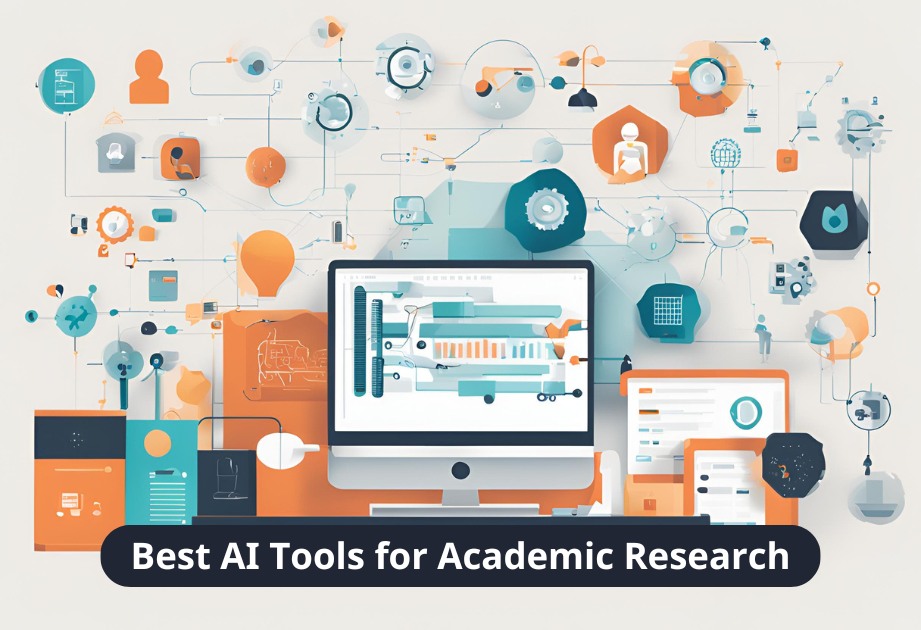Academic research often involves sifting through mountains of data, crafting well-structured papers, and conducting in-depth analyses. Thanks to advancements in artificial intelligence (AI), researchers now have access to powerful tools that can significantly enhance efficiency and accuracy. In this article, we will explore the best AI tools for academic research that are transforming the way scholars and students work. These tools can help with tasks like literature review, data visualization, writing, and citation management.
Table of Contents
The Role of AI in Academic Research
AI has revolutionized various aspects of academic research by automating repetitive tasks, providing data-driven insights, and enabling seamless collaboration. Whether you’re a seasoned scholar or a student, leveraging AI tools can save time and improve the quality of your work. Below, we’ll dive into some of the most impactful tools categorized by their specific functions.
Top AI Tools for Academic Research
1. Zotero: The Ultimate Citation Manager
Zotero is a powerful AI-powered tool designed to help researchers collect, organize, and cite research materials effortlessly. Its key features include:
- Automatic citation generation in multiple formats (APA, MLA, Chicago, etc.).
- Integration with word processors like Microsoft Word and Google Docs.
- A browser extension to save articles, PDFs, and web pages instantly.
Why Choose Zotero? Zotero’s AI capabilities enable it to automatically detect bibliographic information, saving researchers hours of manual entry.
2. Grammarly: Perfecting Your Academic Writing
Grammarly is an AI-driven writing assistant that helps researchers produce polished and professional papers. Its standout features are:
- Real-time grammar and spelling checks.
- Advanced style and tone suggestions.
- Plagiarism detection to ensure originality.
Why Choose Grammarly? For academic writing, Grammarly’s AI algorithms enhance readability and maintain formal tone, crucial for scholarly publications.
3. Scrivener: Comprehensive Writing Software
While not exclusively AI-based, Scrivener’s advanced organizational features are a boon for academic researchers. It supports:
- Breaking large writing projects into manageable sections.
- Research material storage within the platform.
- AI tools for keyword searching and content summarization.
Why Choose Scrivener? It’s ideal for writing theses or dissertations where organization and focus are critical.
4. QuillBot: Paraphrasing and Summarization Made Easy
QuillBot is an AI-powered tool designed to assist with paraphrasing, summarizing, and improving content. Key functionalities include:
- Multiple writing modes (Standard, Formal, Creative).
- AI-powered grammar suggestions.
- Built-in summarizer to condense lengthy articles.
Why Choose QuillBot? Its AI algorithms simplify complex texts, making it easier to grasp key concepts and rewrite content effectively.
5. EndNote: Streamlining Bibliographies
EndNote is another excellent AI tool for managing references and citations. It provides:
- Advanced search capabilities for sourcing relevant studies.
- Collaborative features for team projects.
- AI-powered tools to organize and annotate research materials.
Why Choose EndNote? EndNote’s AI-enhanced search filters and organizational tools are perfect for extensive literature reviews.
AI Tools for Data Analysis and Visualization
1. Tableau: Simplified Data Visualization
Tableau leverages AI to help researchers create visually compelling data presentations. Features include:
- Drag-and-drop functionality for creating charts and graphs.
- AI-generated insights for data trends.
- Integration with multiple data sources.
Why Choose Tableau? Its intuitive interface and AI-driven analytics make it ideal for researchers handling large datasets.
2. NVivo: Qualitative Data Analysis Simplified
NVivo is an AI-based tool specifically designed for qualitative data analysis. It offers:
- AI-powered coding and text analysis.
- Integration with survey platforms.
- Visualization tools for thematic analysis.
Why Choose NVivo? For qualitative researchers, NVivo’s AI features provide deep insights into unstructured data.
3. IBM SPSS: Advanced Statistical Analysis
IBM SPSS is a leading AI tool for statistical data analysis. Key features include:
- Predictive analytics powered by machine learning.
- Automated reporting and data cleaning.
- Easy-to-use interface for non-statisticians.
Why Choose IBM SPSS? Its robust AI capabilities make complex statistical analysis accessible to all researchers.
AI-Powered Literature Review Tools
1. Connected Papers: Exploring Research Networks
Connected Papers is a unique AI-driven tool that visualizes the relationships between academic papers. Its benefits include:
- Mapping relevant research articles.
- AI-powered citation tracking.
- Easy navigation of research networks.
Why Choose Connected Papers? It’s perfect for quickly identifying key papers and understanding research trends.
2. Semantic Scholar: Advanced Paper Search
Semantic Scholar uses AI to help researchers discover and understand scientific literature. Features include:
- AI-powered citation graphs.
- Abstract summarization.
- Personalized recommendations.
Why Choose Semantic Scholar? Its AI engine saves time by prioritizing the most relevant studies based on your research interests.
Conclusion
The integration of AI tools into academic research has opened up new possibilities for efficiency and accuracy. From managing references to analyzing complex data, these tools are invaluable for researchers striving for excellence. Whether you’re a student writing a thesis or a scholar conducting groundbreaking research, leveraging these best AI tools for academic research can help you achieve your goals more effectively.
By incorporating tools like Zotero, Grammarly, Tableau, and Semantic Scholar into your workflow, you can streamline tedious tasks and focus on producing high-quality, impactful work. Start exploring these tools today and transform your academic journey!
Key Takeaways
- AI tools simplify complex academic tasks, such as citation management, data analysis, and literature review.
- Tools like Zotero, Grammarly, and Tableau are essential for modern researchers.
- AI-powered insights enable faster, more accurate research outcomes.
